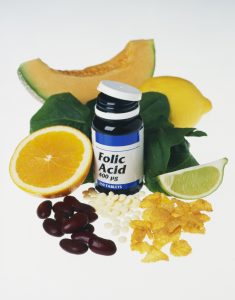Another supplement study, another finding that suggests supplements do not protect against cancer. This latest study focuses on B vitamins and colorectal adenomas or polyps, which have the potential to become cancerous.
Taking a combination of three B vitamin supplements, including folic acid, appears to neither increase nor decrease colorectal polyps, at least among women at high risk for heart disease. Earlier studies have suggested that too much folic acid may actually increase the risk of colorectal cancer for some people, so this finding showing the vitamins caused no polyps is important.
The study was published in the Journal of the National Cancer Institute.
In the study, approximately 5,500 women were randomly given a daily B vitamin supplement or placebo. The supplement was made up of folic acid (B9), vitamin B6 and vitamin B12. Folic acid is the synthetic form of folate, a vitamin found in dark leafy greens and peanuts.
Because about a third of US adults reportedly take a supplement with these three B vitamins, the researchers wanted to test out their effect. Both the participants, who were part of a cardiovascular study, and the researchers did not know who was taking what.
After over 7 years of taking the daily supplement and another 2 years of follow-up, the researchers found no difference in colorectal polyps between the women taking the B vitamins and the placebo group. The finding held when they took into account alcohol intake, history of cancer, body fat, and other factors that affect risk.
Last year, WCRF/AICR’s report found that we can decrease our risk of colorectal cancer by being physically active, eating garlic and foods high in fiber, staying a healthy weight, and limiting consumption of alcohol and red and processed meats.
This study adds to a relatively large body of research on colorectal cancer and B vitamins, specifically folic acid, that has led to dual findings.
On one side, earlier animal studies and — and some population studies –suggested folate and B vitamins may reduce colorectal cancer risk, but the studies are overall inconsistent.
Then observational studies suggested that too much folic acid may increase colorectal cancer risk among those who are susceptible, such as people over age 50. The study saw an increase in colorectal cancer incidence in the years after foods were fortified with folic acid. In 1998, the United States mandated that producers fortify grains with folic acid to reduce neural tube defects in newborns.
The studies linked to increased risk involve folic acid and taking supplements, not folate consumption. Eating your folate is a good thing as folate and the other B vitamins are found in many healthy cancer-protective foods.
Updated AICR estimates suggest that an estimated half of colorectal cancers can be prevented by healthy lifestyle habits.
Although AICR recommends not to use supplements to lower cancer risk, there are many reasons, aside from cancer protection, you might want to take supplements. Here’s the government recommendations for how much of different nutrients you should be getting for good health.





